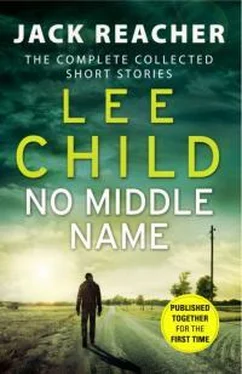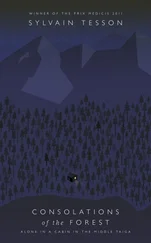Hemingway said, ‘There’s going to be trouble. Give it an hour or so, and there’s going to be rioting, and arson, and a whole lot of looting. So you two, right now, head north as far and as fast as you can. Do not go east or west. Do not use the tunnels. Do not stop until you’re north of 14th Street.’
Reacher said, ‘What are you going to do?’
‘I’m going to work.’
‘You’re suspended.’
‘I can’t stand by and do nothing. And you have to get your friend back where you found her. I think those are our basic obligations.’ And then she ran, south towards Houston Street, and was lost in the dark within seconds.
The street light on Great Jones was no longer working, but the blue Chevette was still under it, grey and formless in the dark, as yet unmolested. Chrissie opened it up, and they got in, and she started the motor and put it in gear. She didn’t turn on the lights, which Reacher understood. Disturbing the massive darkness didn’t seem right. Or possible, even. The great city felt stunned and passive, an immense organism laid low, implacable and indifferent to tiny scurrying humans. Of which there was a growing number within view. Windows were opening, and folks on lower floors were walking down stairs and coming out, standing near their doors and peering about, full of wonder and apprehension. The heat was still way up there. It wasn’t cooling down at all. A hundred degrees, maybe more, clamping down and now smug and settled and supreme, unchallenged by fans or air conditioning or any other kind of man-made mediation.
Great Jones Street was one-way west, and they crossed Lafayette and Broadway, and continued on East Third, Chrissie driving slow and tentative, not much faster than walking pace, a dark car in the dark, one of very few about. Maybe drivers had felt compelled to pull over, as part of the general paralysis. The traffic lights were all out. Each new block was newly weird, still and silent, blank and grey, absolutely unlit. They turned north on La Guardia Place, and went counterclockwise around the bottom right-hand corner of Washington Square, back to the coffee shop. Chrissie parked where she had before, and they got out into the soupy air and the silence.
The coffee shop was dark, obviously, with nothing to see behind its dusty glass window. The air conditioner above the door was silent. And the door was locked. Reacher and Chrissie cupped their hands and pressed them to the glass and peered through, and saw nothing except vague black shapes in the dark. No staff. No customers. Maybe a health board thing. If the refrigerators went out, maybe they had to abandon ship.
Reacher said, ‘Where will your friends have gone?’
Chrissie said, ‘No idea.’
‘You said there was a plan.’
‘If one of us gets lucky, we meet back here at midnight.’
‘I’m sorry you didn’t get luckier.’
‘I feel OK now.’
‘We’re still south of 14th Street.’
‘They won’t find you in the dark, surely.’
‘Will we find your friends in the dark?’
‘Why would we want to? They’ll get back by midnight. Until then we should hang out and experience this. Don’t you think? This is pretty amazing.’
And it was. There was a hugeness to it. Not just a room or a building or a block, but the entire city, slumped inert and defeated all around them, as if it was ruined, as if it was dead, like a relic from the past. And maybe it was more than just the city. There was no glow on any horizon. Nothing from across either river, nothing from the south, nothing from the north. Maybe the whole Northeast was out. Maybe all of America. Or the whole world. People were always talking about secret weapons. Maybe someone had pulled a trigger.
Chrissie said, ‘Let’s go look at the Empire State Building. We may never see it like this again.’
Reacher said, ‘OK.’
‘In the car.’
‘OK.’
They went up University, and used Ninth Street across to Sixth Avenue, where they turned north. Sixth Avenue was nothing at all. Just a long black hole, and then a small rectangle of night sky where it ended at Central Park. There were a few cars on it. All were moving slow. Most had their lights off. Like the Chevette. Instinctive, somehow. A shared assumption. Crowd behaviour. Reacher caught a sudden whiff of fear. Hide in the dark. Don’t stand out. Don’t be seen .
Herald Square had people in it. Where Broadway cut across, at 34th Street. Most of them were out in the middle of the triangle, away from the buildings, trying to see the sky. Some of them were formed up in moving bunches, like sports fans leaving the stadium after a win, with the same kind of boisterous energy. But Macy’s windows were all intact. So far.
They kept going all the way to West 38th, crawling past the dead traffic lights and the cross streets, unsure every time whether they should yield or keep on going, but it turned out there was no real danger of either fender benders or confrontation, because everyone was moving slow and acting deferential, all after you, no, after you . Clearly the spirit so far was cooperation. On the roads, at least. Reacher wondered how long it would last.
They went east on 38th and turned on Fifth four blocks north of the Empire State. Nothing to see. Just a broad dark base, like both sides of every other block, and then nothing above. Just spectral darkness. They parked on the Fifth Avenue kerb, on the block north of 34th Street, and got out for a closer look. 34th was a double-wide street, with a clear view east and west, dark all the way, except for an orange glow in the far distance above what must have been Brooklyn. Fires were burning there.
‘It’s starting,’ Reacher said.
They heard a cop car coming north on Madison, and they saw it cross the six-lane width of 34th Street one block over. Its lights looked amazingly bright. It drove on out of sight, and the night went quiet again. Chrissie said, ‘Why did the power go out?’
‘Don’t know,’ Reacher said. ‘Overload from all the AC, or a lightning strike somewhere. Or the electromagnetic pulse from a nuclear explosion. Or maybe someone didn’t pay the bill.’
‘Nuclear explosion?’
‘It’s a known side effect. But I don’t think it happened. We’d have seen the flash. And depending where it was, we’d have been burned to a crisp.’
‘What kind of military are you?’
‘No kind at all. My dad’s a Marine, and my brother is going to be an army officer, but that’s them, not me.’
‘What are you going to be?’
‘I have no idea. Probably not a lawyer.’
‘Do you think your FBI friend was right about riots and looting?’
‘Maybe not so much in Manhattan.’
‘Are we going to be OK?’
Reacher said, ‘We’re going to be fine. If all else fails, we’ll do what they did in the olden days. We’ll wait for morning.’
They turned on to 34th Street and drove over as close as they could get to the East River. They stopped on a trash-strewn triangle half under the FDR Drive, and they stared through the windshield over the water to the dark lands beyond. Queens dead ahead, Brooklyn to the right, the Bronx way far to the left. The fires in Brooklyn looked pretty big already. There were fires in Queens, too. And the Bronx, but Reacher had been told there were always fires in the Bronx. Nothing behind them, in Manhattan. Not yet. But there were plenty of sirens. The darkness was getting angry. Maybe because of the heat. Reacher wondered how Macy’s windows were doing.
Chrissie kept the engine running, for the AC. The gas was about half full. The tails of her shirt hid her shorts completely. She looked like she was wearing nothing else. Just the shirt. Which looked great. She was very pretty. He asked, ‘How old are you?’
Читать дальше











